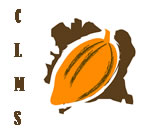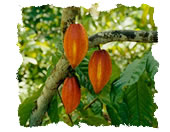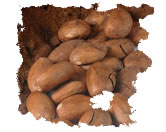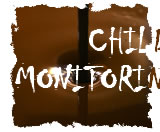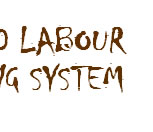Real Actions on the ground
|
Prevention Actions
|
| |
 |
Strengthening of capacities through the Sustainable Tree Crop Program (STCP), sensitization actions on the ground through the farm schools, with particularly the topics "child labour". Partners involved are : the State of Côte d'Ivoire, the cocoa supply chain, IITA, and the chocolate industry (WCF)
|
| |
 |
Training and sensitizing through didactic equipment (specialized books, posters, etc.) through the WACAP program, in six zones of production. Partners involved are: State of Côte d'Ivoire, ILO/IPEC.
|
| |
 |
Training and sensitization in the whole territory (covering all zones of cocoa production) by Agence Nationale d'Appui au Développement Rural (ANADER), within its terms of references ;
|
| |
 |
Close-up of all actions of sensitization during the organization of the international seminar on the certification process of the production of cocoa from May 26-28 2004. Several participants included local, sub-regional and international partners. This seminar has confirmed the commitment of Côte d'Ivoire of which some signs have materialized. Our country has fully played its leadership role, giving an example which derived in several cooperation requests from other coca producing countries (Ghana).
|
|
| |
Penal Action of child labour
|
In the absence of a specific law repressing the child labour practices in the cocoa sector, one refers to the Ivorian penal law in its articles 370 and others which follow.
|
| |
On this basis, 200 child traffickers were arrested and jailed as of today. According to data provided by the national surveillance agency, DST, the police actions undertaken have helped intercept 700 children from Burkina Faso, Mali, Togo, Benin, Niger, and Côte d'Ivoire, etc. as victims of child traffic.
|
| |
The intercepted children within Côte d'Ivoire and on the farms were hosted in the welcoming centers of the International Catholic Bureau for children (Bureau international Catholique pour l'Enfance (BICE), in the Abel Community, Afrique Secours et Assistance (ASA), EASEMO, where they were fed, cared and psychologically taken care before being sent back home or to their respective families.
|
| |
A project of law dealing with child trafficking has been drafted, adopted in the Council of Ministers, and is pending for the vote vat the National Assembly.
|
| |
Integrated Action involving coca producers to achieve the certification process
|
At the level of integrated action, an ad hoc committee (CI-CTF) has undertaken several actions and works to design a Child Labour Monitoring System (CLMS) in the cocoa sector, with the support of the chocolate industry and ILO/IPEC.
|
| |
Curative actions |
| |
WACAP Project |
Following persistent reports on the use of child labor in the cocoa sector, ILO has initiated a WACAP project, project to eliminate abusive child labor practices in the commercial agriculture, and in the cocoa sector. The WACAP program started in 2003 and will end by April 2006. It covers five countries including Côte d'Ivoire , Ghana , Guinea , Cameroon , and Nigeria. |
| |
Partners |
|
|
| |
Short term Objectives |
|
|
| |
| Summary table of actions undertaken by WACAP project |
| NB : The Educational program provided is taken into account by the Ministry of Education which supports and review the staff involved in the WACAP training program |
| |
Other results |
About one hundred (100) persons originated from implementing agencies have been trained on trainer's training manual on child labor and thirty (30) have been trained on child labor monitoring ;
Six thousand one hundred sixty (6,160) children at risk, i.e., those who may be in a child labor situation, and those who are working have been retrieved from plantations have been trained on formal education programs, or on job. Few solutions include paying school fees of children or finding revenue- rewarding activities for parents so that they will accept to let their children go to school.
Two hundred (200) adult families children were assisted with agricultural equipment and training .
About seventeen thousand five hundred (17,500) children and adults were sensitized on child labor issues
Two (2) training and community action centers were established.
One (1) consultative council of the project was created
Four (4) district committees on child labor monitoring were established and are operating in cities such as Abengourou, Daloa, Soubré, and Adzopé.
Six (6) sub-district committees have been set up in Niablé, Yakassé, Daloa, Grogbeu, Soubré, and grand Zattry
Fifty nine (59) village committees are working and twenty four (24) are equipped and are part of the program of data collection, analysis and exploitation on child labor practices and databank. The objective is to equip all the village committees for a best coverage of the whole country. |
| |
Expected results by April 2006 |
Nineteen thousand five hundred (19,500) adults to be sensitized on child labor issues and its dangers
Thirty five thousand (35,000) children must have sensitized and reached by the health and world security activities
Seven thousand (7,000) children must benefit from a retrieval, education and training program
Three hundred and fifty (350) families must be assisted by education and economic programs |
| |
WINROCK / CLASSE PROGRAM |
Given the significant migratory flows from countries in the sub-region toward Côte d'Ivoire , a zone of cocoa production, therefore a strong demand of manpower, the Winrock program has initiated the pilot project called "CLASSE", i.e., alternative solutions to child labor through a sustainable education program. The pilot project is extending on the period of July 2002 to July 2007. The program deals with children in age of schooling (5 to 12 years old) and children out of school (12-18 years old).
|
| |
Partners |
| |
| |
Short term Objectives |
|
| |
Areas of involvement of the project |
|
| |
Project activities |
Construction of classrooms
Integration of children in the school system (formal or professional)
Support to educational structures at the local and national level
Strengthening of capacity of teachers, agricultural professional organizations |
| |
Results |
Three (3) classrooms built at Ehouéguié
One hundred twenty (120) children put in school at Ehouéguié
One (1) school canteen built and two rehabilitated canteens for the restoration of children
One hundred three (103) persons admitted to the alphabetization program
Eight (8) trainers trained for the alphabetization program
Development of agricultural activities: creation of catering and vegetable nurseries, creation of cocoa nursery and a wooden park in each school;
About two hundred fifty (250) pupils in age were trained in agriculture
Thirty (30) scholarship/micro loans were provided
Strengthening of capacity of teachers, committees to manage schools
Renovation of a training center for agriculture at Afféry
Education program on health-care and leadership issues
Cocoa planting is underway in each geographical area of the project |
| |
Sustainability program |
Increase the capacity of committee managing schools
Develop a partnership with training agencies and institutions
Develop a true partnership with the Ministry of Civil Service and Employment in the setting-up of district, sub-district committees in charge of child labor monitoring |


